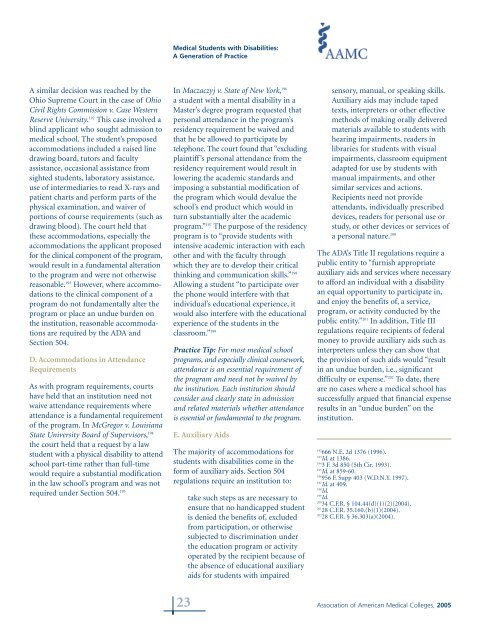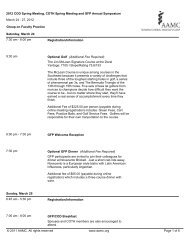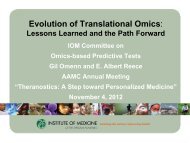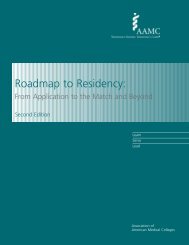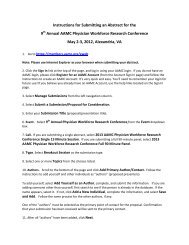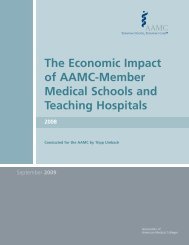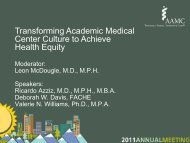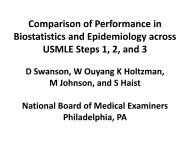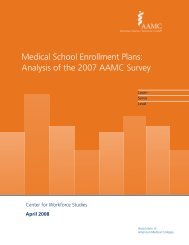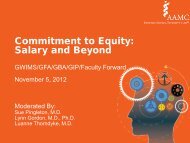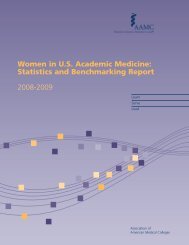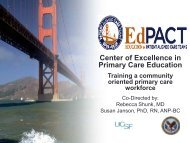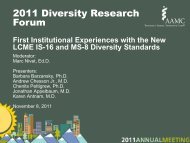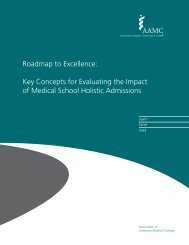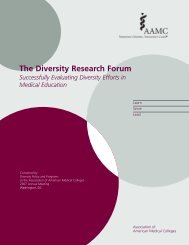Medical Students with Disabilities: A Generation of Practice
Medical Students with Disabilities: A Generation of Practice
Medical Students with Disabilities: A Generation of Practice
You also want an ePaper? Increase the reach of your titles
YUMPU automatically turns print PDFs into web optimized ePapers that Google loves.
<strong>Medical</strong> <strong>Students</strong> <strong>with</strong> <strong>Disabilities</strong>:<br />
A <strong>Generation</strong> <strong>of</strong> <strong>Practice</strong><br />
A similar decision was reached by the In Maczaczyj v. State <strong>of</strong> New York, 196<br />
Ohio Supreme Court in the case <strong>of</strong> Ohio a student <strong>with</strong> a mental disability in a<br />
Civil Rights Commission v. Case Western Master’s degree program requested that<br />
Reserve University. 192 This case involved a personal attendance in the program’s<br />
blind applicant who sought admission to residency requirement be waived and<br />
medical school. The student’s proposed that he be allowed to participate by<br />
accommodations included a raised line telephone. The court found that “excluding<br />
drawing board, tutors and faculty plaintiff’s personal attendance from the<br />
assistance, occasional assistance from residency requirement would result in<br />
sighted students, laboratory assistance, lowering the academic standards and<br />
use <strong>of</strong> intermediaries to read X-rays and imposing a substantial modification <strong>of</strong><br />
patient charts and perform parts <strong>of</strong> the the program which would devalue the<br />
physical examination, and waiver <strong>of</strong> school’s end product which would in<br />
portions <strong>of</strong> course requirements (such as turn substantially alter the academic<br />
drawing blood). The court held that program.” 197 The purpose <strong>of</strong> the residency<br />
these accommodations, especially the program is to “provide students <strong>with</strong><br />
accommodations the applicant proposed intensive academic interaction <strong>with</strong> each<br />
for the clinical component <strong>of</strong> the program, other and <strong>with</strong> the faculty through<br />
would result in a fundamental alteration which they are to develop their critical<br />
to the program and were not otherwise thinking and communication skills.” 198<br />
reasonable. 193 However, where accommodations<br />
to the clinical component <strong>of</strong> a the phone would interfere <strong>with</strong> that<br />
Allowing a student “to participate over<br />
program do not fundamentally alter the individual’s educational experience, it<br />
program or place an undue burden on would also interfere <strong>with</strong> the educational<br />
the institution, reasonable accommodations<br />
are required by the ADA and classroom.” 199<br />
experience <strong>of</strong> the students in the<br />
Section 504.<br />
<strong>Practice</strong> Tip: For most medical school<br />
D. Accommodations in Attendance programs, and especially clinical coursework,<br />
Requirements<br />
attendance is an essential requirement <strong>of</strong><br />
the program and need not be waived by<br />
As <strong>with</strong> program requirements, courts the institution. Each institution should<br />
have held that an institution need not consider and clearly state in admission<br />
waive attendance requirements where and related materials whether attendance<br />
attendance is a fundamental requirement is essential or fundamental to the program.<br />
<strong>of</strong> the program. In McGregor v. Louisiana<br />
State University Board <strong>of</strong> Supervisors, 194 E. Auxiliary Aids<br />
the court held that a request by a law<br />
student <strong>with</strong> a physical disability to attend The majority <strong>of</strong> accommodations for<br />
school part-time rather than full-time students <strong>with</strong> disabilities come in the<br />
would require a substantial modification form <strong>of</strong> auxiliary aids. Section 504<br />
in the law school’s program and was not regulations require an institution to:<br />
required under Section 504. 195 take such steps as are necessary to<br />
ensure that no handicapped student<br />
is denied the benefits <strong>of</strong>, excluded<br />
from participation, or otherwise<br />
subjected to discrimination under<br />
the education program or activity<br />
operated by the recipient because <strong>of</strong><br />
the absence <strong>of</strong> educational auxiliary<br />
aids for students <strong>with</strong> impaired<br />
sensory, manual, or speaking skills.<br />
Auxiliary aids may include taped<br />
texts, interpreters or other effective<br />
methods <strong>of</strong> making orally delivered<br />
materials available to students <strong>with</strong><br />
hearing impairments, readers in<br />
libraries for students <strong>with</strong> visual<br />
impairments, classroom equipment<br />
adapted for use by students <strong>with</strong><br />
manual impairments, and other<br />
similar services and actions.<br />
Recipients need not provide<br />
attendants, individually prescribed<br />
devices, readers for personal use or<br />
study, or other devices or services <strong>of</strong><br />
a personal nature. 200<br />
The ADA’s Title II regulations require a<br />
public entity to “furnish appropriate<br />
auxiliary aids and services where necessary<br />
to afford an individual <strong>with</strong> a disability<br />
an equal opportunity to participate in,<br />
and enjoy the benefits <strong>of</strong>, a service,<br />
program, or activity conducted by the<br />
public entity.” 201 In addition, Title III<br />
regulations require recipients <strong>of</strong> federal<br />
money to provide auxiliary aids such as<br />
interpreters unless they can show that<br />
the provision <strong>of</strong> such aids would “result<br />
in an undue burden, i.e., significant<br />
difficulty or expense.” 202 To date, there<br />
are no cases where a medical school has<br />
successfully argued that financial expense<br />
results in an “undue burden” on the<br />
institution.<br />
192<br />
666 N.E. 2d 1376 (1996).<br />
193<br />
Id. at 1386.<br />
194<br />
3 F. 3d 850 (5th Cir. 1993).<br />
195<br />
Id. at 859-60.<br />
196<br />
956 F. Supp 403 (W.D.N.Y. 1997).<br />
197<br />
Id. at 409.<br />
198<br />
Id.<br />
199<br />
Id.<br />
200<br />
34 C.F.R. § 104.44(d)(1)(2)(2004).<br />
201<br />
28 C.F.R. 35.160.(b)(1)(2004).<br />
202<br />
28 C.F.R. § 36.303(a)(2004).<br />
23 Association <strong>of</strong> American <strong>Medical</strong> Colleges, 2005


